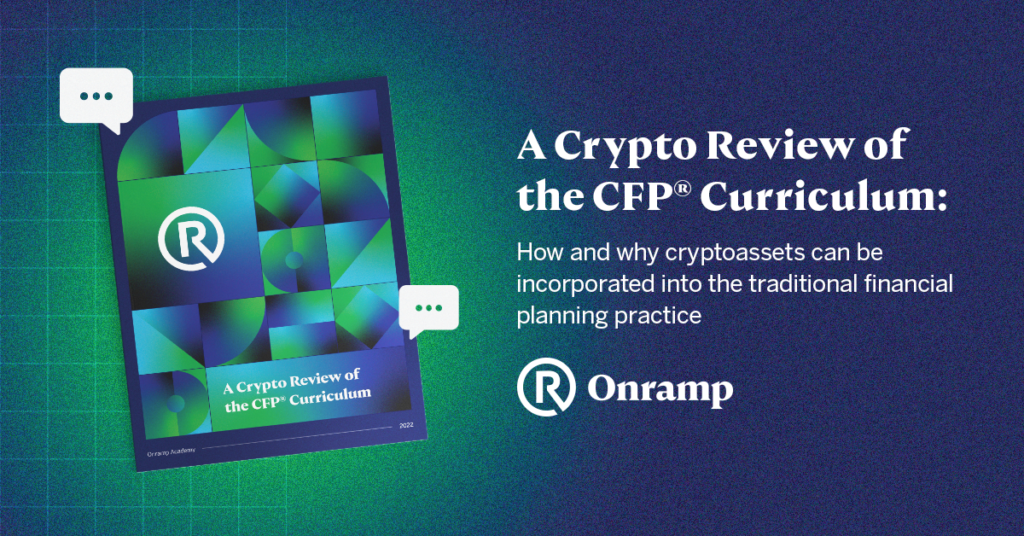
A Crypto Review of the CFP® Curriculum: Psychology of Financial Planning (Part 8 of 8)
Human psychology plays an inarguable role in all aspects of life, but nowhere more so than the topics of sex, relationships, and finances. The psychology of money has been heavily researched in recent decades and is now believed by many to be an essential pillar of the financial services industry. As such, exam takers can expect to see a new section added to their CFP® education requirements in March of 2022 that is dedicated to this very topic.
Humans and emotions are inextricably linked. Rather than attempting to find a way around emotions or avoid them all together, financial advisors should consider developing an intimate understanding of emotional reasoning. To help financial professionals develop an intimate understanding of the intersection of cryptoassets and the psychology of financial planning please see the discussion below.
While this final knowledge domain is primarily focused on client psychology, it is also important to consider the impact of advisor psychology in the realm of cryptoassets. In particular, what biases does the advisor have that could impact their ability to see clients’ cryptoassets from a neutral perspective? Cryptocurrency and decentralized finance could have the ability to threaten traditional financial structures. If leaders within traditional finance feel threatened by decentralized finance do they have incentive to downplay its significance? Could this threat cause financial institutions and the advisors within these institutions to have a bias against cryptocurrency? Overconfidence in the status quo? Confirmation bias? Just as important, if an advisor is bullish on cryptoassets, these biases also need to be considered.
Client and planner attitudes, values, biases
From learning how to assess both themselves and their clients and how psychology, background, and values play a role in financial decisions, to determining the best course of action as trusted fiduciaries with those items in mind, there is a lot for financial professionals to consider. When it comes to cryptoassets in particular, one of the most important considerations is accounting for the impact that your personal values and biases, or those of your client, may have when defining client financial goals and determining a strategy for reaching them.
Retail investors work with advisors (among other reasons) for their educated opinions and guidance on investment-related matters. As the traditional and cryptoasset markets continuously evolve, so too should advisors’ viewpoints. Keeping well informed of market developments should be done with the ultimate goal of remaining prepared, open-minded and able to provide best in class advice. Personal opinions regarding an asset class should not deter fiduciaries from gathering the information necessary to educate clients on their options and determine what will best help them reach their goals. By remaining balanced, uncovering areas of potential conflict, separating opinion from fact, and determining whether the facts align with client values, investment preferences, and their long-term financial plan, advisors can adhere to their fiduciary responsibilities by acting in a manner consistent with the client’s best interests.
Rather than succumb to confirmation bias when it comes to cryptoassets (or other asset classes) by solely seeking out information that supports your current views, financial advisors should ensure that they are arming themselves with all necessary information from relevant sources to serve their clients. On the other side of the coin, financial advisors should continue to have open conversations with their clients to determine key values, attitudes, potential biases, and misconceptions that could hinder the financial planning process, and follow up by providing education and support where necessary.
Recency bias, the tendency for investors to put too much emphasis on recent market-related events, can lead to short-term oriented thinking. Financial advisors should make a concerted effort to assist their clients in navigating short-term turbulence and help them remain focused on what’s most important for achieving long-term goals. Behavioral biases impact all investors, but those biases are often heightened within the cryptoasset market, a space that is expanding rapidly, operates 24/7, and has earned its fair share of press across social media and news outlets. Although behavioral biases such as the two highlighted above cannot be entirely eliminated, developing a strong understanding of how they are expressed and how to best mitigate them is a major component of the financial planning process.
Behavioral finance
Behavioral finance (BeFi) centers around the study of psychological impacts on investors and financial markets as a whole. Even the most studied of market participants have been found to act irrationally, going against what is factually known and thus deviating from rationality. This applies to the cryptoasset market as well; advisors should be having open and honest conversations with clients on an individualized basis around risk tolerance. Material information such as your client’s comfort zone, prior financial beliefs, socialization, and money experiences throughout life inevitably shape their thoughts, actions, and behaviors pertaining to money. Can your client stomach the inherent volatility of cryptoassets? When examining their current financial plan, what is their risk tolerance and, based on risk tolerance, is crypto a suitable investment? If your client wants to invest in cryptoassets, is the decision being driven by FOMO, or a long-term investment thesis?
Financial advisors can also help clients navigate the turbulence by creating structured processes that mitigate the potential for emotionally-driven decisions within any investment. This becomes increasingly important when transacting in highly volatile asset classes such as crypto. Educating clients on the inherent risks of cryptoassets, remaining committed to a regular dollar-cost averaging schedule rather than timing the market, and scheduling frequent check-ins with clients regarding cryptoasset allocations are just a few of the ways that advisors can help clients avoid making emotionally-driven decisions. All of the above should be included within clients’ financial plans.
Sources of money conflict
Disagreements concerning financial matters are a key pain point of many relationships. Cryptoassets are an emerging asset class and, as such, have been an inherently controversial topic for many investors. Advisors should be prepared to help clients navigate uncomfortable conversations when conflicts arise amongst spouses or family members in regard to how money should be spent, whether money should be put towards cryptoasset investments, the merits of the asset class vs alternative options, whether an investment in cryptoassets aligns with long-term investment goals, tolerance for the risks and volatility associated with the asset class, and so on.
Principles of counseling
Any relationship, personal or professional, inevitably involves the management of expectations and emotions. With money and emotions being inextricably linked, it only makes sense that financial advisors be well equipped to navigate the ebbs and flows of both markets and market participants in a way that mimics traditional counseling theories. Whether counseling clients on the fear of missing out (FOMO) they experience from not investing in the latest crypto craze, or calming the nerves of clients when crypto volatility rears its ugly head, financial advisors should be prepared to console and manage portfolio-related client crises, life crises that impact finances, and anything in between. Within an asset class in which many people around the world have accumulated life-changing wealth, counseling around FOMO is a notable area in which advisors will inevitably need to become competent. Generally speaking, financial advisors must ensure that they are fostering an environment of trust and candor with their clients.
General principles of effective communication
The way in which financial advisors communicate with clients about cryptoassets can be done most effectively by using the Seven C’s of communication: clarity, correctness, conciseness, courtesy, concreteness, consideration, and completeness. The cryptoasset space is evolving rapidly and with that growth has come a wide array of misinformation and confusion. Like with any other asset class, financial advisors should look to provide retail investors with sound guidance and education on cryptoassets that is easily comprehensible, factual, and respective of the client’s current situation and long-term goals. They should also exercise active listening skills and watch for verbal and non-verbal cues when interacting with clients about investments, their financial plan, etc. When it comes to investment opportunities such as crypto, the ability to educate clients on the asset class and recent developments in the space, clearly explain the reasons for market turbulence, the impact of cryptoassets on a broader portfolio, and other important information to help inform clients of the risks and benefits of crypto is of the utmost importance. By clearly and consistently communicating with clients about various areas of the market, advisors build trust and help ensure their clients have the information needed to succeed financially.
Crisis events with severe consequences
In the event of unanticipated financial emergencies, crypto downturns, or widespread market corrections, financial advisors should ensure that their clients always have a plan. Any investments, cryptoasset investments included, should be accounted for within said plan. In instances of financial distress, should assets used to deal with said emergency be pulled from crypto market gains? What is the strategy for determining where to source funds from in case of emergencies, and how are various funds categorized within the broader portfolio? Advisors who actively assist their clients in these situations could provide tremendous value during stressful times.

Access the Full Report
Our full report is available for all Onramp Academy users. The intent of the report is to provide financial advisors with a resource to compare their current credentials with the potential credential curriculum of the future. The report is 55 pages in length and includes cryptoasset commentary on each of the eight sections of the CFP® exam (including the newly minted Psychology of Financial Planning section). In our opinion, it’s a must-read for every financial professional as the space evolves in the digital realm!
If you are not an Academy member, use the form below and we will email you the report.
As always, educate before you allocate!
With gratitude, Your Onramp family
